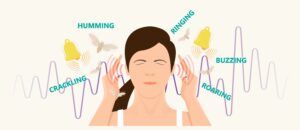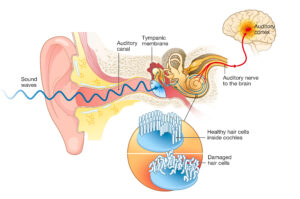Discover the connection between tinnitus and ear wax buildup. Find out why cleaning your ears can reduce the severity of Tinnitus.
Tinnitus and Pulsatile Tinnitus: In tinnitus, individuals perceive sounds like buzzing, ringing, whistling, and clicking, even when external sounds are absent.

Causes
- Exposure to loud noise over short or long period
- Age-related hearing loss occurs as structures in the ear become less flexible
- Earwax blockage blocks the sound waves from travelling through the ear canal properly
- Ear infections can cause inflammation and damage to the structures in the ear
- Some medications, like antibiotics, antidepressants, and aspirin, can contribute to the condition.
- Meniere’s disease can affect the inner ear and cause associated dizziness
- Head or neck injuries, head or neck injuries can cause damage to the structures in the ear

Pulsatile tinnitus, characterised by a rhythmic sound often synced with the individual’s heartbeat, distinguishes itself as a specific type of tinnitus.”It is an amplified sound of blood circulating through the arteries and often sounds like a whooshing or thumping. It can occur in one ear or both.
While a range of factors can cause it, sometimes there’s no identifiable cause. The major causes include a change in blood flow or a change in perception of that blood flow.
Some causes of are:
- Ear wax or infection blockages
- Strenuous exercise
- Pregnancy
- Severe anemia or low iron in the blood
- Hyperthyroidism
- High blood pressure
- Atherosclerosis (fatty plaques in the blood vessels of the neck)
- A kinked or narrowed neck artery
- An injury to the head or neck
What should I do symptoms persist?
- See your GP
- You will have a comprehensive medical history taken
- A stethoscope will be used to listen to your head, neck and skull
- Your blood pressure will be checked
- You may possibly require further testing such as blood tests, audiometry, imaging tests such as ultrasound, CT or MRI of the brain and blood vessels
- Your healthcare provider may refer you to an Otolaryngologist for further assessment.
How are they treated?
The underlying cause must be treated. High blood pressure and artery conditions can usually be treated with a combination of medications and lifestyle changes including:
- A low-salt diet
- Regular exercise
- No smoking
- Stress reduction
- Having ear wax or infection removed by the Expert Ear Nurses can be one method of helping ease the symptoms of tinnitus and pulsatile tinnitus
- Ease off on alcohol and caffeine: these can temporarily worsen tinnitus for some people.
- Do some regular exercise: this can help you to ignore it and better cope with it.
- Finally, accept it as part of you and understand that it will wax and wane during your life.
Cindy Morris, Registered Nurse Education Coordinator